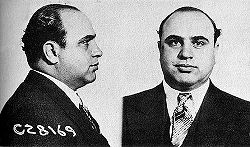"Get Capone: The Secret Plot That Captured America’s Most Wanted Gangster"
"I've never heard of anyone getting more than five years for income tax evasion," said the man known as "Scarface." "It's a blow to the belt." At the time, Capone's sentence was by far the stiffest ever made in a tax-evasion case. It put the Chicago mob boss forever out of business and crippled his criminal enterprise. A reasonable argument can be made that Capone was punished for his long list of perceived and actual crimes, not just for his failure to pay income tax. The income-tax charge wasn't the most precise weapon for bringing Capone to justice, but it was the quickest and surest, and the government preferred not to waste time.
Today, while Capone remains American history's most iconic gangster, his greatest legacy may be his punishment. Tax cases are used routinely to go after suspected criminals--including drugs dealers, spies, embezzlers and, most recently, terrorists--who might otherwise escape punishment. In today's cases, as in Capone's, a quick prison sentence is often deemed more important than a lengthy one, in order to prevent future crimes.
Some critics complain that Capone-style cases are disingenuous and damage the government's credibility. But there's no denying their efficacy. And the prosecutor in the Capone case--the U.S. attorney for the Northern District of Illinois, George E.Q. Johnson--was among the first to hit on it: By separating Capone's failure to pay taxes from his other crimes, he made his case almost impossible to lose. He didn't have to prove that Capone earned his money through criminal conduct, only that he made money and failed to pay income tax.
The federal government had tried for years to build a strong case against the gangster, but he was slippery. He delegated the outfit's dirty work and left his name on none of the organization's bank records. But Herbert Hoover assumed the presidency on a law-and-order platform, and he was determined to show the government's strength--even as the Great Depression began to drag down his administration and the nation.
Hoover ordered his top cabinet officials to use all available manpower and spare no expense in going after Capone. They settled on tax evasion almost as a last resort. And, as newly discovered government documents reveal, federal prosecutors and Department of Justice officials fretted that Capone would get no more than a couple of years behind bars. If that happened, they worried, the government would once again appear weak and ineffectual.
Capone ridiculed the government's obsession and took a shot at Hoover: "I've been made an issue, I guess, and I'm not complaining," he said. "But why don't they go after all those bankers who took the savings of thousands of poor people and lost them in bank failures? How about that? Isn't it lots worse to take the last few dollars some small family has saved--perhaps to live on while the head of the family is out of a job--than to sell a little beer, a little alky? Believe me, I can't see where the fellow who sells it is any worse off than the fellow who buys it and drinks it."
Capone sounded a populist argument that rings true even today. He went a step further in his public-relations war with the president, sponsoring a popular soup kitchen on Chicago's South Side, as if to show that he cared more than Hoover for the nation's down and out.
Many in the press took the gangster's side.
"I ain't got nothing against Snorky Capone except wishing he would turn on a better brand of tap beer in the loop," wrote Damon Runyon, using the gangster's preferred nickname, which meant "ritzy" in the jargon of the day.
Get the rest here. Jonathan Eig's new book, "Get Capone: The Secret Plot that Captured America's Most Wanted Gangster," will be published April 27 by Simon & Schuster.








No comments:
Post a Comment